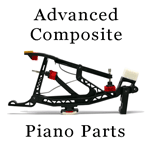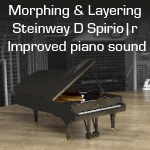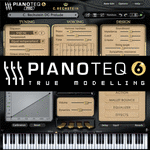 |
Welcome to the Piano World Piano Forums
Over 3 million posts about pianos, digital pianos, and all types of keyboard instruments.
Over 100,000 members from around the world.
Join the World's Largest Community of Piano Lovers
(it's free)
It's Fun to Play the Piano ... Please Pass It On!
|
|
|
|
88 members (brdwyguy, Aleksandr Sun, ambrozy, BlakeOR, accordeur, Boboulus, 36251, Animisha, 28 invisible),
566
guests, and
426
robots. |
|
Key:
Admin,
Global Mod,
Mod
|
|
 Cybertuner or Verituner
|
Joined: Feb 2016
Posts: 9
Junior Member
|
OP

Junior Member
Joined: Feb 2016
Posts: 9 |
I have been using Tunelab for quite some time now. I tune only the unisons by ear and let the app create tuning curves for me. My problem with the app is that I'm not satisfied with how it tunes spinets and other poorly scaled pianos, so I started to look at other options.
From discussions I found online, tuners seem to share the opinion that Cybertuner and Verituner are very capable of creating good tunings on poorly scaled pianos. This is one of two reasons I'm looking to switch apps. The second reason is that from what I've read, a main advantage of Cybertuner, at least for me, is that using the Smart Tune function, one can tune a piano that needs a pitch raise with only one pass. This is possible as long as the piano is no more than 20 cents flat. Then just cleaning up some unisons is needed.
I do a couple hundred pitch raises every year, and if Cybertuner helps me do less of them, that would save a lot of stress on my shoulder and wrist. This is a big deal for me.
Please share your opinion on how Verituner compares if you have used it. It would also be helpful to hear any other comparisons in regards to these two apps.
Thank you!
|
|
|
 Re: Cybertuner or Verituner
|
Joined: Dec 2018
Posts: 238
Full Member
|

Full Member
Joined: Dec 2018
Posts: 238 |
I have no experience with anything other than cybertuner.
I am able to do pitch raises and tuning of 30-100 cents in 2-3 hours with CyberTuner. Around 20 cents one time pass in 90 minutes. Sometimes smart tune is not accurate and I have to clean up a bit and puts me at 120 minutes for 20-30 cent tunings, but most of the time it is very good.
Last edited by TimM_980; 03/29/19 03:50 PM.
|
|
|
 Re: Cybertuner or Verituner
|
Joined: Apr 2010
Posts: 2,276
2000 Post Club Member
|

2000 Post Club Member
Joined: Apr 2010
Posts: 2,276 |
I have no experience with anything other than cybertuner.
I am able to do pitch raises and tuning of 30-100 cents in 2-3 hours with CyberTuner. Around 20 cents one time pass in 90 minutes. Sometimes smart tune is not accurate and I have to clean up a bit and puts me at 120 minutes for 20-30 cent tunings, but most of the time it is very good. Or, do by ear: pitch-raise 13 minutes and 2nd pass in 35. Write the invoice, get check, chat with customer and still out of the house in an hour.
Keith Akins, RPT
Piano Technologist
USA Distributor for Isaac Cadenza hammers and Profundo Bass Strings
Supporting Piano Owners D-I-Y piano tuning and repair
editor emeritus of Piano Technicians Journal
|
|
|
 Re: Cybertuner or Verituner
|
Joined: Feb 2016
Posts: 9
Junior Member
|
OP

Junior Member
Joined: Feb 2016
Posts: 9 |
That's interesting. It takes me 20-30min to do a pitch raise and another 50-60min to fine tune using Tunelab.
You mentioned that you haven't tuned with other apps, but I wonder if Cybertuner is somewhat harder to use if it takes at least 2 hours to pitch raise and tune a piano.
@Keith, it's amazing that you can tune that fast. Hats off...
|
|
|
 Re: Cybertuner or Verituner
|
Joined: Dec 2018
Posts: 238
Full Member
|

Full Member
Joined: Dec 2018
Posts: 238 |
That's interesting. It takes me 20-30min to do a pitch raise and another 50-60min to fine tune using Tunelab.
You mentioned that you haven't tuned with other apps, but I wonder if Cybertuner is somewhat harder to use if it takes at least 2 hours to pitch raise and tune a piano.
@Keith, it's amazing that you can tune that fast. Hats off...
I am probably doing something really wrong. I thought it was fast because it takes me forever to tune by ear.
|
|
|
 Re: Cybertuner or Verituner
|
Joined: Jul 2012
Posts: 197
Full Member
|

Full Member
Joined: Jul 2012
Posts: 197 |
Cant vouch for cybertuner but i really like verituner and it found its overpull feature very good.
|
|
|
 Re: Cybertuner or Verituner
|
Joined: Jan 2004
Posts: 2,216
2000 Post Club Member
|

2000 Post Club Member
Joined: Jan 2004
Posts: 2,216 |
Excuse me while I go into ETD wonky mode!
TeeBach states that he is looking for an ETD to do the full calculation of any particular piano - allowing the technician to only focus on the unisons. Any of the current crop of decent ETDs can be used to pitch-adjust, with varying requirements from the technician.
A little history:
There have been leaps in progress for ETDs over the years. Consider the first generations, similar to simple "guitar tuners" that are all around. While it is possible to tune a decent Eb-Eb temperament octave, the lack of any stretch means that pretty soon working out from the middle, the octaves will begin to beat. Why Eb-Eb? A4 sits right in the middle and that range of the piano hardly shows any stretch when measured.
Next generation offered stretch flexibility with either dials or built-in stretch tables which began the search for the elusive stretch... Sometimes it worked, and sometimes not so well because there wasn't any measuring of the individual piano - the maps created didn't match the specific piano - especially challenging scales.
Sanderson Accutuner was the big step in taking measurements from the piano to build a scaling model of the piano that could then be used to create the tuning calculation. Others followed taking 3, or 5 or more measurements of the piano to build that model of the inharmonicity of the scale. If you look at what Tunelab does during that process, it gives you an idea of how those ETDs work. After the direct measurement of a single string is complete, that data is boiled down to an inharmonicity constant - a single number "fudge factor" that approximates the inharmonicity data of the string. (uh, oh, approximations?) Then the ETD uses those few constants to guess what the constants might be for the rest of the piano. In all honesty, the guesses are usually good, and the approximations usually work out... Except for challenging pianos! Enter the split-scale tuning mode in Tunelab and other ways to try to make the approximations more reflective of the piano. This is where TeeBach and many other techs find themselves... Tune and move on, or go ahead and tune it by ear are the usual recomendations...
Verituner is really a different ETD in that the measurements are not boiled down to an inharmonicity constant, and it measures all the notes from A0-C7, so that a more realistic map of the scaling can be used to drive the tuning calculation. Even in the default "Average" mode, Verituner is more responsive to the quirks of individual pianos. Accessing the custom stretch modes allows the tech to further tailor the calculation to the piano.
A simple reason why this gets so complex is that while our ear may be able to easily hear when tuning an octave moving through flat, closer, closer, good, sharp, sharper(similar to how many approach unison tuning)... ETDs can with precision place an octave at a determined width of any particular partial match, but struggle to tell when just when an octave sounds "good". The ETD stretch difficulty is still how to articulate to the software where to place each octave match so that the piano can sound the best. Without full information, this challenge is more difficult.
So yeah, if you are looking for an ETD that really gives the "best" tuning calculations, especially for difficult scales, I haven't found anything to beat the Verituner yet.
Ron Koval
|
|
|
 Re: Cybertuner or Verituner
|
Joined: Apr 2010
Posts: 2,276
2000 Post Club Member
|

2000 Post Club Member
Joined: Apr 2010
Posts: 2,276 |
Excuse me while I go into ETD wonky mode!
So yeah, if you are looking for an ETD that really gives the "best" tuning calculations, especially for difficult scales, I haven't found anything to beat the Verituner yet.
Ron Koval Ron, I appreciate your "wonky mode" explanation. I'm very interested in the science of how ETAs work. In fact, when I was Journal editor I was going to have an article (or series of articles) on that subject because my observation is that most ETD users don't really understand how they machines work and what limitations may be -- but I was forbidden to cover that topic. I agree that ETAs are continuously being improved and we continue to define more closely what the parameters of good tuning are. (We're not there yet, though). Although I'm not a user of ETAs (they would slow me down), I own a couple (given to me by people whose "ultimate" ETA had been superseded by the "next ulitmate" one) and have used them and seen others use them. That said, I would recommend the Verituner as the one I would use if I were going to use one. But there are people who do excellent tunings with any of the high-end tuning aids.
Keith Akins, RPT
Piano Technologist
USA Distributor for Isaac Cadenza hammers and Profundo Bass Strings
Supporting Piano Owners D-I-Y piano tuning and repair
editor emeritus of Piano Technicians Journal
|
|
|
 Re: Cybertuner or Verituner
|
Joined: Feb 2016
Posts: 9
Junior Member
|
OP

Junior Member
Joined: Feb 2016
Posts: 9 |
Thank you Ron, your valuable insight is much appreciated! So yeah, if you are looking for an ETD that really gives the "best" tuning calculations, especially for difficult scales, I haven't found anything to beat the Verituner yet.
Does that mean that you have also tried Cybertuner and still find Verituner at least on the same level in terms of tuning calculations?
|
|
|
 Re: Cybertuner or Verituner
|
Joined: Feb 2016
Posts: 9
Junior Member
|
OP

Junior Member
Joined: Feb 2016
Posts: 9 |
Cant vouch for cybertuner but i really like verituner and it found its overpull feature very good. I get faster and better results when doing overpull with Tunelab compared to when I do it aurally, but it isn't as close throughout all octaves as I want it to be. How precise is Verituner's overpull? Also, do you need to take sample notes prior to starting the overpull or it calculates the necessary pull as you go?
|
|
|
 Re: Cybertuner or Verituner
|
Joined: Jan 2011
Posts: 1,698
1000 Post Club Member
|

1000 Post Club Member
Joined: Jan 2011
Posts: 1,698 |
I don't recommend a single pass pitch raise if the piano is more than about 10 cents, or a few hertz, flat at A4. The initial pitch raise pass does not have to be precise. It should be banged up quickly if the piano is new-ish. About 15 minutes is possible if you just keep moving and not bother at that stage with accuracy. I suspect that ETD users spend too much time trying to get the "needle" to "stop" because they are unsure about how much inaccuracy is ok or not. A few cents off is ok if it is random and averages about zero.
If the average pitch across the range is about right after a quick pitch raise then the fine pass will not result in pitches changing significant during the pass.
A two-pass tuning for a moderate pitch correction will be more stable than a massive single-pass pitch raise.
For an old piano it is foolish to overpull at all. The first pass needs to be careful in terms of string integrity. Normally I would drop the pitch just a tad to ensure that the string is able to slide across the terminations. That will take a little longer.
|
|
|
 Re: Cybertuner or Verituner
|
Joined: Feb 2014
Posts: 131
Full Member
|

Full Member
Joined: Feb 2014
Posts: 131 |
I don't recommend a single pass pitch raise if the piano is more than about 10 cents, or a few hertz, flat at A4.
For an old piano it is foolish to overpull at all. The first pass needs to be careful in terms of string integrity. Normally I would drop the pitch just a tad to ensure that the string is able to slide across the terminations. That will take a little longer. I totally agree. There may be people with the mindset to overpull and if strings break they break. I did this way back when first learning to tune. But dealing with rust on semi-tone flat spinets is not worth the headache dealing with drop actions. I'd rather tune faster with very small amount of overstretch.
|
|
|
 Re: Cybertuner or Verituner
|
Joined: Jan 2004
Posts: 2,216
2000 Post Club Member
|

2000 Post Club Member
Joined: Jan 2004
Posts: 2,216 |
Thank you Ron, your valuable insight is much appreciated! So yeah, if you are looking for an ETD that really gives the "best" tuning calculations, especially for difficult scales, I haven't found anything to beat the Verituner yet.
Does that mean that you have also tried Cybertuner and still find Verituner at least on the same level in terms of tuning calculations? ...and SAT and Tunelab and OnlyPure, and Dirk's, and Entropy and Easy Piano Tuner... And for the reasons stated above I'll repeat that Verituner is on a different level from all of the other gear currently available. Even Entropy and Easy Piano Tuner - which gather data on each note - boil that data down to a single "fudge factor" inharmonicity constant and lose the ability to really go back to the information from an individual note to effect the curve. Another topic not even talked about yet is the "smooth curve" approach of tuning to a single partial that is the basis of most of the standard ETDs that measure a few notes. That's what you see in the Tunelab graph... When you look at the graphs from gear that tries to be responsive to scale changes on a note-to-note basis, the bumps and jumps are obvious to the eye, even on well-scaled instruments... The results to the ear may vary from subtle to obvious. Yet another question remains: what are you doing to help your ETD? We often focus on what it does for us, but read your manual (again) and do all you can to make sure you are doing your best to get accurate data in! Even for techs not comfortable with aural tuning, it is possible to use some of the custom functions on any of the ETDs to vary the stretch. One simple approach is to pre-tune one string of a series of octaves (All Cs or As, etc) then carefully listen to the octave combinations and decide "is that good enough, or is that one beating a little"? Choose another setting or partial match and re-tune and see if it is better or worse. Try it involving a note close to the break and you may find your current gear unable to land that note in a "good" or "least bad" location for difficult pianos. In this manner you can build an experience base for what settings match which model of piano. In effect, the ETD is used to tune from the outside in - starting with a verified ladder of notes to establish a pleasing stretch. Taken another step further, it is possible to set a ladder of octaves by ear and then guide the ETD to create the octaves as close to your goal as possible and then document that setting for use with other pianos of the same model. In effect establishing a "rule set" for pleasing octaves when combined with the data taken from the piano. (What combination of wide or narrow interval matches create the appropriate curve?) Using this method is what pushed me from one gear to the next in the search for the elusive stretch. If aural tuners think they are immune to any of this, rest assured they experience plenty of their own issues related to temperament as well as finding the best stretch. Consider when working out from the middle and then having to chose a slightly wider or narrower octave farther away from the temperament octave. What that means is that all of the notes previously tuned should be retuned so that the stretch alters gradually without any obvious shifts from one test interval to another. Some aural techs seem to have a natural ability at this, others.... not so much. (present company excepted, of course, because we are all above average here!) This takes you into the realm of hybrid tuning; using the ETD to do what it does best, under the guidance of what our ears do more easily - identify "good" or "least bad" unisons and octaves. Ron Koval
|
|
|
 Re: Cybertuner or Verituner
|
Joined: Dec 2011
Posts: 32
Full Member
|

Full Member
Joined: Dec 2011
Posts: 32 |
Keith-
"I was going to have an article (or series of articles) on that subject because my observation is that most ETD users don't really understand how they machines work and what limitations may be -- but I was forbidden to cover that topic."
"Forbidden" to cover that topic? By whom, I wonder.
DB
Last edited by tunerman; 03/30/19 11:08 AM.
David C. Brown RPT
Garland TX
tunermandb88.com
|
|
|
 Re: Cybertuner or Verituner
|
Joined: Dec 2011
Posts: 32
Full Member
|

Full Member
Joined: Dec 2011
Posts: 32 |
Keith-
"I was going to have an article (or series of articles) on that subject because my observation is that most ETD users don't really understand how they machines work and what limitations may be -- but I was forbidden to cover that topic."
"Forbidden" to cover that topic? By whom, I wonder.
DB
Last edited by tunerman; 03/30/19 11:09 AM.
David C. Brown RPT
Garland TX
tunermandb88.com
|
|
|
 Re: Cybertuner or Verituner
|
Joined: Oct 2011
Posts: 837
500 Post Club Member
|

500 Post Club Member
Joined: Oct 2011
Posts: 837 |
I've used TuneLab for many years and I understand your frustration with poorly scaled pianos. Make sure you're making full use of the Split scale mode as well as Auto partial selection. They are helpful but I mainly end up checking the bass octaves by ear anyway. I'm going to put in a little plug for Easy Piano Tuner (Now called Smart Piano Tuner) as an additional ETA (I prefer Electronic Tuning Aid or App) for you. If you use Android then you might give it a try. If RCT & Verituner give you sticker shock then SPT will be one to consider. The professional version is only $100. You download it from the Google Play Store and that means you can put it on as many devices as you want (Android only) and it will even run on Chromebooks, that now will run Google Play apps (I've done it so I know it works). There are also continuous update/upgrades. It handles the poorly scaled pianos very well and has many great features like Over-pull, Full Auto note selection and it continuously takes in data as you tune, unless you lock the tuning. The beta version has support for unequal temperaments now. Now, I'm not at all saying that it's better than RCT or Verituner. Even though I haven't used either of them I know they are both fabulous software. But, both of them run on iPhone/iPad devices and have no support for Android. So, if you're an Apple person they're the ones you should go for. I believe RCT has a monthly or yearly fee to continue using it and you can only have it on one device. For me this is a big deal because being dependent on an ETA, backup, backup, backup is very important. So, with SPT this isn't a problem. Again, I don't think you could go wrong with RCT or Verituner and I think if I had a choice between those two I'd go with Verituner. In fact I may have purchased it by now if worked on Android. But, SPT is one you should consider. Anyway, that's my 2 cents... 
|
|
|
 Re: Cybertuner or Verituner
|
Joined: Jan 2019
Posts: 325
Full Member
|

Full Member
Joined: Jan 2019
Posts: 325 |
It may be worth mentioning iStroboSoft. I’ve read that its accuracy is equivalent to Peterson’s expensive hardware tuners and it’s certainly the fastest and most accurate tuner I’ve used (granted I’m an aural tuner and don’t really use them...). It’s very surprising how good it is on an iPhone even with its built-in mic.
The iPhone version also has several upgrades, including ‘sweetners’ (i.e. stretch, $20 for keyboard instruments) and an interesting ‘harmonic tuning’ upgrade ($20) which displays the fundamental with 4 levels of harmonics. It has other interesting upgrades as well.
Of course it doesn’t have a pitch raise feature, but it’s only $10 for the initial purchase. I heard they will be releasing an update although I have no idea what will be in it.
|
|
|
 Re: Cybertuner or Verituner
|
Joined: Jan 2011
Posts: 1,698
1000 Post Club Member
|

1000 Post Club Member
Joined: Jan 2011
Posts: 1,698 |
Quote: "Using this method is what pushed me from one gear to the next in the search for the elusive stretch"
Ron, i think you are making incorrect assumptions about aural tuning. Firstly, stretch is not elusive at all. It will be though if octave are tuned as you say by trying to pick a "correct" octave and then going back if you had chosen the wrong type. Gosh, that would make things hard, so no wonder you prefer ETDs.
There is no need to be concerned with an octave type at all. If during the expansion you simply get the best compromise between 8ths, 12ths, 15ths and 19th where possible then the natural stretch of the piano will just happen. Bill Bremer has been advocating this for years with his "mindless octaves". The use of sostenuto or sustain while tuning is essential. It is basically simple and works for any piano. All you need to do is to listen.
Rant over, and my apologies to the OP.
|
|
|
 Re: Cybertuner or Verituner
|
Joined: Jan 2004
Posts: 2,216
2000 Post Club Member
|

2000 Post Club Member
Joined: Jan 2004
Posts: 2,216 |
Stretch is not elusive for many aural tuners. Agreed. For many others, evidence points to other conclusions...
Ron Koval
|
|
|
 Re: Cybertuner or Verituner
|
Joined: Jun 2003
Posts: 29,180
Yikes! 10000 Post Club Member
|

Yikes! 10000 Post Club Member
Joined: Jun 2003
Posts: 29,180 |
... Agreed. For many others, evidence points to other conclusions...
Ron Koval Only because people started measuring frequencies instead of tuning intervals.
Semipro Tech
|
|
|
|
Forums42
Topics205,003
Posts3,059,773
Members100,477
| |
Most Online15,252
Mar 21st, 2010
|
|
|
|
|
|

|





















